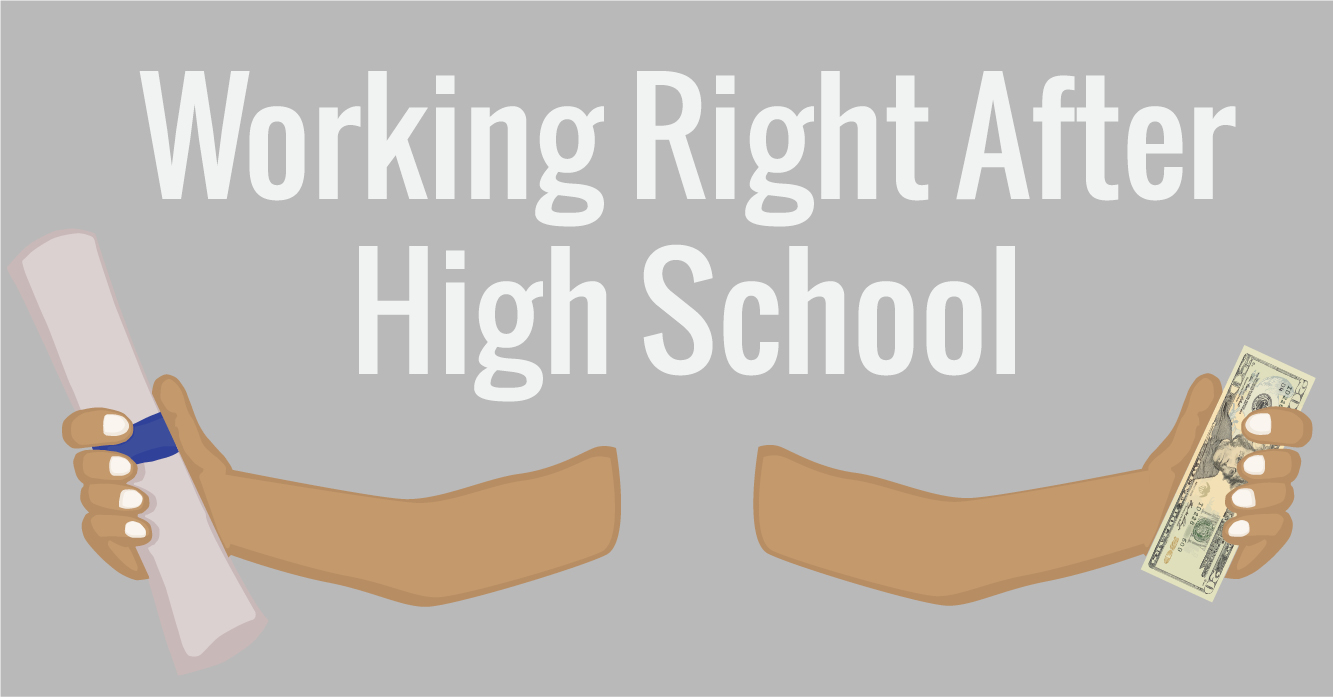Life After High School
-
What are my options after high school? There are so many options available that will help you on your career path after high school. Many people think they must go to a 4-year college. This is not the case, there are various options from which you can pursue. Your Junior and Senior years of high school are when you will think about and decide upon whether to start applying to Four-Year Univeristy or Two-Year College, enroll in a Vocational Education Program, explore Gap Year Programs, enter the Military, or go directly into the Workforce. The choice is yours!
Post-Secondary Options
-
Four-Year University

Four Year colleges or universities are educational institutions where you can earn a Bachelor of Arts (BA) or Bachelor of Science (BS) degree.
You can attend a public or private institution and each college offers different majors and fields of studies. Depending on the college, you can study almost anything ranging from psychology to business to health or technical sciences. The admissions criteria varies for each school and some are extremely competitive.
College is a rewarding experience, but it is important to remember that being a college student requires a lot of self-discipline and personal responsibility.
It is also important to note that although we are referring to these schools as four year colleges, many students take four and a half to five years to complete their bachelor’s degrees. This also does not count continuing on to earn a Master's Degree, Ph.D., or Medical Degree.
-
Two-Year College

Two year colleges are schools that offer associate’s degrees, either Associate of Arts (AA) or Associate of Science (AS) degrees. There are public and private options and the admissions process is generally simpler than that of a four-year school.
An Associate’s degree is a minimum requirement for some jobs and can prepare you for a career in two years. After two years, many students decide to continue with their studies and transfer to a four year college to earn a bachelor’s degree. Depending on the number of credits that transfer and your school’s requirements you may able to complete your bachelor’s degree in another two years.
Public community colleges usually do not provide housing in dormitories, but they are widely accessible and often the cheapest option. Private junior colleges are similar to four-year colleges, but only award Associate’s degrees.
Associate’s degrees are also available in a number of academic fields including accounting, business administration, criminal justice, and technical theater.
-
Vocational Education

What are job training, career, vocational, or technical programs?
Many students have a strong interest in a particular occupation and want to start working as soon as possible. In these situations, Vocational Education, which can last anywhere from a few weeks to a couple of years, is a great option. Programs provide training for a variety of careers ranging from cosmetology to computer technicians to veterinary assistants to culinary arts.
When looking into specific schools and programs it is important to verify the school’s certification and accreditation. It is also important to consider the financial costs and if any types of disability support will be available.
-
Gap Year Programs

Each year, an estimated 30,000 to 40,000 students take gap years, a practice that saw a 23% increase in the United States last year. But taking time off to travel the world is expensive. And it’s not covered by Bright Futures or FAFSA. Often between high school and college, a gap year needs to be structured and should contribute to the student’s education.
Gap Year programs offer opportunities for students to explore areas of interest as they plan for their postsecondary education and careers. A "gap year" does not have to be a full year and can be taken at any point in time, although a common time is between high school and starting the next step in formal education.
Gap years are a time for students to explore the greater community, nation, or world, reflect on personal values and goals, and prepare for the next step in life. Gap year programs provide students with an opportunity to expand their perspective and gain direction that give their postsecondary education and career pursuits meaning and focus. For many students, the programs also provide them with time to develop independence and confidence and pursue various fields of interest. Many community colleges and universities support student participation in gap year programs.
-
Military

The minimal age for enlisting in the military is 17. However, there are also other requirements including a high school diploma, physical requirements and placement tests. You may enlist in one of the branches of the military immediately after high school and there are also opportunities to join the military through college programs and after college as an officer.
It is important to note that uniformed personnel branches of the military are not covered by Section 504 of the Rehabilitation Act or the Americans with Disabilities Act (ADA),which guarantee rights and reasonable accommodations for individuals with disabilities. The United States Military’s branches include the Army, Navy, Air Force, Coast Guard, Marines, and the National Guard. To learn more about military options, contact a local recruiting office.
When it comes to learning about the Military, knowing where to start your research may seem daunting. Don't worry — Today’s Military is there to help. Today's Military overview pages show the various stages of a military career, from the joining process to training, working and taking advantage of military benefits.
Discover what it takes to join the Military and learn how a career of service can lead to a fulfilling life.
-
Entering the Workforce

Many high school students today are making responsible and courageous decisions to enter into the workforce immediately after high school for a number of reasons. Some students know exactly what they want to do and have been working towards that all of high school. Others tend to struggle in school and feel that entering the workforce is a better use of their time and talent than attending school for another several years. Still, others desire to make money immediately after high school and wish to do so in a specific career. No matter what category you fall into, transitioning from high school to the Workforce can be challenging.
Freshman and Sophomores should explore what their schools and local communities have to offer that interest them so they can get their feet wet in a chosen field or industry. Get involved with Clubs and Organizations on your high school campus and volunteer in your community to help you pinpoint your interests and passions.
Juniors and Seniors should think about getting a part-time job related to a chosen field. This will build your network of connections in the job you would like to go into so you can eventually ask about moving up in the company. Even if you’re not about to graduate, start making connections with local companies and take notes on what companies are hiring for what positions. It can take a while to land a great job, so the sooner you start, the better. Knowing the job market and what is available in a particular industry may help you to narrow down or re-focus your search as well.
Keep your thirst for knowledge alive beyond high school. Take online classes, keep reading, talk to successful people, and just never stop learning. If you feel led to continue your education at any point or in any way, just do it. If you have the opportunity to take a class or get a certification, just do it. Keep learning and striving to gain more knowledge and you’ll continue to make yourself valuable to any company you come into contact with.
It’s never too early or too late to start preparing yourself for a smooth process of transitioning from high school to a career. Do whatever you can to make the transition seamless, enjoyable, and successful. Don’t forget to talk to your parents, school counselor, academic advisor, or any other trusted adult to get support, assistance, and encouragement as you are transitioning from high school to a career.

